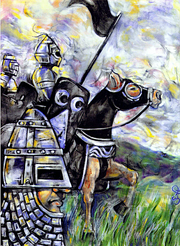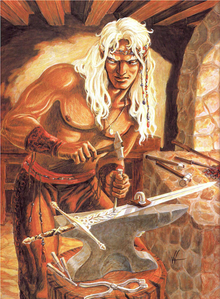Albion is a Changeling Kingdom coinciding with the country of England.
Overview

Though some Kithain who know the old tales still refer to the whole of England as the Kingdom of Albion, each year fewer childlings are taught the story of King Albion, the high king whose reign lasted over 500 years. The Kingdom of Albion is divided into five separate kingdoms: the Kingdom of Roses, the Kingdom of Chalk, the Kingdom of Mist, the Kingdom of Smoke (formerly Wool) and the Kingdom of Heather. The sidhe rule once more in many of the kingdoms, and though the War of Ivy (known as the Accordance War in Concordia) was relatively bloodless in Albion, resentment still bums in the hearts of both commoners and nobles.
At the present time, the five kingdoms of Albion are in turmoil. Once united under a single banner, the kingdoms now stand divided. Each pursues its own interests with little care for what the others do. Relations with other kingdoms throughout Albion, Caledonia and Cymru are cordial or strained, depending on who you speak with.
Though the changelings of England are not politically united, some common ties do bind them. The Changing Breeds who call Britain their home are tolerated due to a common concern for the environment and a shared reverence for the past. Ghosts are commonly regarded as capricious in a creepy sort of way, and are therefore given a wide berth. Vampires are generally viewed with suspicion, and though most changelings know little of Kindred internal politics, the name Tremere puts fear into childlings and grumps alike with remembered tales of Meerlinda's betrayal and bizarre experiments behind locked iron gates. Cordial relations have characterized most dealings between mages and changelings, and all childlings are taught of the good deeds mages performed on behalf of the fae and their changeling kin.
In the past century, England's dreams have begun to fade. With the collapse of the British Empire, the decline of the monarchy, and the rise of socialism, England's identity has been permanently changed. Fae blood no longer courses through the royal line, and the modern English paradigm of an unfailingly polite, well-ordered society maintaining the status quo has stifled many a dreamer.
Most changelings traveling to England will find the locals willing to answer questions and help out wherever necessary. Certainly, typical "ugly Americans" will find the reception chilly whether Kithain or not, but on the whole most changelings are eager to share the old tales with newcomers in exchange for stories of travels. Many British changelings resent the airs that Concordian nobles have taken on of late by usurping the ancient traditions and claiming Concordia as the new Land of Dreams. But most will give American commoners the benefit of the doubt, for the English understand all too well the chasm between the needs and wishes of the people and the actions of their leaders.
Trods
Though legends speak of ancient fae who, when the stars were right, were able to open trods between any two places in the world, most English trods fell into disuse after the Shattering. Generations of changelings lived and died with only a scant few passing the knowledge of the trods down. Those who knew the secret pathways guarded them jealously. But since the Return of the sidhe, trods long-since forgotten have reappeared. Although some remain secret, more of the Old Roads are being traveled once more.
Many trods follow the "old straight tracks" or ley lines, but others connect the most ancient freeholds to one another. Though they were once used to help distant freeholds stay in touch with one another, some fear that they could be used to invade other kingdoms. Although none of the kingdoms of Albion seem likely to do so at present, some fear that outside forces (such as Ross of Caledonia) could use the Old Roads to stage swift and deadly attacks.
The Monarchy & the Fae
For untold centuries, the monarchy, the land, and the fae have been intertwined in a tapestry of fate. Although there is no longer a blood tie between the crown and the fae (or their changeling descendants) who likewise live to protect the land and its people, rituals are still observed, even today, to maintain their connection.
Yet with each passing generation, a little is forgotten. The power of the monarchy was curtailed long ago, but in modem times the blood of the fae has grown so thin that they can wield no Glamour. Career politicians have taken center stage, and most know little of the Old Ways which guarded England and kept her safe for so long. With every passing year, more and more concern is directed toward the economy, foreign policy, and abstract social reform, with little regard for the land or the actual people who are affected by the policies.
The mortal monarchy is in ruins, its deeds the stuff of modem penny dreadfuls and tabloids. The leaders who have risen to take their place have done so without ceremony, without ritual, and neither know nor care about the importance of the Old Ways. The age-old leaders of changelings, the sidhe, have returned, but they fare little better than their mortal cousins. Like the politicians, they seem to have little understanding of the real needs of their subjects. The nobles seem unwilling or unable to lead their people, and the commoners scramble to promote their own agendas. The sharp chill of Banality has settled hard on many areas, and others wonder how much longer they will last. The oldest scholars fear that Winter is nearly upon us; still others claim that we have been in the grip of Winter for a long time, and that Spring is surely just around the corner.
The land is divided. The traditions that bound the people to the land and the land to its leaders are forgotten, and no new leader has come forth to unite the Isle of the Mighty. Some insist that no single leader can represent the widely varying interests of the people; perhaps in a simpler age this was possible, they contend, but no longer. But others remember the old tales, and whisper that when the land is united once more under a single high king, Spring will come again to the land and its people.
Whatever the truth, the time has come for action. Without a leader, the kingdoms will continue to drift further from each other and from the land, and some fear that freeholds or entire kingdoms may loose their connection to the land entirely. Will they rejoin the Dreaming, become dream realms of their own, or disappear entirely? Only time will tell... time, and the dreams of those who inhabit the land.
Kithain

England is the source of many of the most enduring faerie myths and legends, but in recent years it seems fewer and fewer English Dreamers have been inspired to create tales about their native land. And like their mythic forebears, the English fae seem to have diminished in power over time, just as those who were once considered gods in the early tales of the Isle were nothing more than mischievous imps and fragile insects by the height of the Victorian age. Today's Kithain are not united, and each kingdom is so beset with problems from Dauntain, rogue chimera, and the ever-present threat of Banality that few have time to think of things on a national scale. Many have begun to miss the forest for the trees, so focused have they become on individual problems, niggling details, and worries.
Seelie Court
Though they once shared power equally with the Unseelie Court by exchanging the reins of power twice yearly on the Changing Days, the Seelie Court reigned virtually unopposed for close to two centuries. Today, in the aftermath of the War of Ivy, the two courts have become more equal in size, as the so-called "golden age" of King Albion's reign has ended and more Kithain have become embittered. Though in the past Seelie fae of all kith kept in close contact, in the last few decades they have become increasingly isolationist, with groups within individual kingdoms having less contact with outsiders.
Unseelie Court
The Unseelie Court is far more organized than its Seelie counterparts, with an effective information network connecting the furthest-flung islands with the heart of London and beyond. Over the past century, it seems that more Kithain have begun to favor their Unseelie sides, and chose who have not fallen to Banality have swelled the ranks to the point that the two courts are nearly equal in size.
Shadow Court
The Shadow Court maintains a small but effective presence in Albion. Its most prominent members are Lord and Lady Greenlance of Nottingham, and many of its agents are Unseelie commoners, rather than the Thallain and sidhe who dominate in Concordia and elsewhere. Most English Kithain are completely unaware that the Shadow Court is active at all in their area, preferring to dismiss any incidents as either the result of over zealous Unseelie childlings or lone Dauntain.
Fiefs
- Kingdom of Roses
- Kingdom of Chalk
- Kingdom of Mist
- Kingdom of Smoke
- Kingdom of Heather
- Principality of Tears
References
- CTD. Isle of the Mighty, pp. 28, 29,
